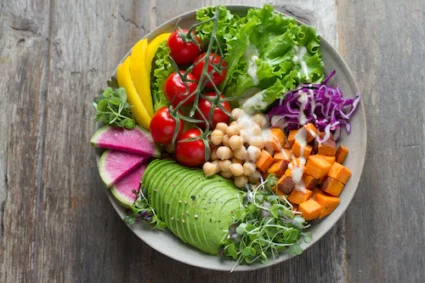Veganism is a lifestyle that seeks to exclude all forms of animal exploitation and cruelty, for food, clothing, or any other purpose. Vegans avoid all animal-derived products, including meat, dairy, eggs, honey, and gelatin.
Why Go Vegan?
- There are many reasons to go vegan, such as:
- Health: A vegan diet is rich in nutrients, fiber, and antioxidants, which can lower the risk of chronic diseases such as heart disease, diabetes, and cancer.
- Environment: Animal agriculture is a major contributor to greenhouse gas emissions, deforestation, and water pollution.
Preparing for a Vegan Lifestyle
Start with Small Changes
Transitioning to a vegan lifestyle can be overwhelming, especially if you are used to eating meat and dairy products. To make the transition smoother,start by making small changes to your diet. For example, try a plant-based meal once a day or switch to plant-based milk. Gradually increasing the number of vegan meals will help you adjust to the new lifestyle without feeling overwhelmed.
Educate Yourself
Before going vegan, it’s essential to educate yourself about vegan nutrition, food substitutes, and cooking techniques. Read books, watch documentaries, and join online vegan communities to learn more about veganism and connect with other vegans.
Connect with the Vegan Community
Connecting with the vegan community can help you stay motivated and get support during the transition. Join local vegan groups, attend vegan events, and participate in online forums to connect with other vegans and learn from their experiences.
Protein
Contrary to popular belief, vegans can easily meet their protein requirements by consuming a variety of plant-based protein sources such as legumes, nuts, seeds, tofu, and tempeh. Aim to consume 0.8 grams of protein per kilogram of body weight per day.
Calcium
Calcium is essential for strong bones and teeth. Vegans can get their calcium requirements from plant-based sources such as leafy greens, tofu, fortified plant-based milk, and calcium-fortified orange juice.
Iron
Iron is essential for healthy blood cells and energy production. Vegans can get their iron requirements from plant-based sources such as legumes, fortified cereals, tofu, and dark leafy greens. Consuming vitamin C-rich foods can also enhance iron absorption.
Vitamin B12
Vitamin B12 is essential for nerve function and red blood cell production. Vegans should supplement with vitamin B12 or consume vitamin B12-fortified foods such as plant-based milk, cereals, and nutritional yeast.
Omega-3 Fatty Acids
Omega-3 fatty acids are essential for brain health and inflammation reduction. Vegans can get their omega-3 requirements from plant-based sources such as flaxseeds, chia seeds, walnuts, and algae-based supplements.
4. Vegan Meal Planning
A vegan diet should include a variety of foods from the following food groups:
- Whole grains: such as brown rice, quinoa, and whole wheat pasta
- Legumes: such as beans, lentils, and chickpeas
- Fruits and vegetables: such as leafy greens, berries, and root vegetables
- Nuts and seeds: such as almonds, cashews, and sunflower seeds
Vegan Meal Ideas
There are endless vegan meal ideas that are both delicious and nutritious, such as:
- Vegan chili with beans, vegetables, and spices
- Veggie stir-fry with tofu and brown rice
- Lentil soup with vegetables and herbs
- Chickpea curry with coconut milk and spices
- Vegan pizza with tomato sauce, veggies, and vegan cheese
How to Read Labels
Reading labels is essential to avoid hidden animal-derived ingredients. Look for ingredients such as milk, eggs, honey, and gelatin, and avoid products that contain them.
Eating Out as a Vegan
Eating out as a vegan can be challenging, but it’s not impossible. Check online menus before going to a restaurant, ask for vegan options, and be willing to customize dishes to make them vegan.
Vegan Fashion and Beauty
Vegan fashion and beauty products are free from animal-derived materials and ingredients. Look for products that are labeled as vegan or cruelty-free.
Overcoming Challenges
Going vegan can be challenging, especially in the beginning. However, with time and effort, it becomes easier. Here are some common challenges and tips on how to overcome them:
Social Pressure
It’s common to face social pressure when going vegan. Friends and family may not understand or support the decision. However, it’s essential to stay firm in your beliefs and communicate your reasons for going vegan. If necessary, bring your own food to social gatherings or suggest vegan-friendly restaurants.
Cravings
It’s natural to crave non-vegan foods when transitioning to a vegan lifestyle. However, there are many vegan substitutes available, such as vegan cheese, meat alternatives, and desserts. Experiment with different foods to find vegan versions that satisfy your cravings.
Time Constraints
Preparing vegan meals can take more time than non-vegan meals. However, there are many easy and quick vegan recipes available online. Plan your meals ahead of time and meal prep to save time during the week.
Nutrition Deficiencies
It’s essential to ensure you’re getting all the necessary nutrients when following a vegan diet. Consult with a registered dietitian to create a balanced meal plan that meets your nutritional needs.
Environmental Benefits
Animal agriculture is a significant contributor to greenhouse gas emissions, deforestation, and water pollution. By going vegan, you can reduce your environmental impact.
Health Benefits
A well-planned vegan diet can provide many health benefits, such as reducing the risk of heart disease, diabetes, and certain types of cancer.
Ethical Benefits
Going vegan aligns with many people’s ethical beliefs of not wanting to harm animals. By going vegan, you can reduce animal suffering and exploitation.
Conclusion
Going vegan is a personal choice that can have many benefits for your health, the environment, and animal welfare. However, it’s essential to prepare for the transition by educating yourself, connecting with the vegan community, and planning your meals. Overcoming challenges such as social pressure and cravings takes time and effort, but the benefits are well worth it. By going vegan, you can make a positive impact on the world and live a healthier and more ethical life.

